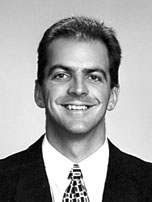 | Derrick Nielsen specializes in helping clients manage the conflictual issues inherent in family businesses. He has worked with siblings and cousins to create structures, systems and policies that help them work together effectively as owners and managers. Derrick has assisted companies improve their governance systems through the formulation of strategic and operational plans, the creation of Owners' Charters and Family Constitutions, the facilitation of Family Council meetings and retreats, and the introduction or enhancement of Advisory Boards or legal Boards of Directors. In addition to his client work, Derrick coordinates Legasus Group's research and development efforts. He has shared the Legasus approach to the family business system in a number of public seminars, private workshops and published articles. Derrick's diverse background includes two years on Desmond Tutu's Truth and Reconciliation Commission, a year teaching in a South African high school, and a year tutoring American Politics at Oxford University in England. He has a B.A. from Georgetown University and is currently completing his Ph.D. dissertation for Oxford University. Derrick can be reached at (316) 681-0444 or by e-mail at dnielsen@legasusgroup.com |
Business Consulting
2004-07-01 10:05:00
'Core' values can be everything
: My wife and I own a successful, local business. For several years I have been thinking about the future of the business - and about how it will have to change to survive. At the same time, I believe we have values and traditions worth carrying on that will continue to make the company successful. What do you think? Are these values I feel so strongly about really important to the future of our business?
ANSWER: I recently read about a group of twenty-five of the world's oldest business dynasties that meet routinely in Germany. They call themselves Les Hénokiens, after the Biblical patriarch Enoch who was reputedly 365 years old at his death. The group claims to comprise the most exclusive club of its kind in the world. Companies have to be at least 200 years old and still majority-owned by founding families in order to qualify for membership. Interestingly, the member companies seem to share a common genius for transforming and diversifying at key points in their histories, while at the same time preserving traditions of craftsmanship and family values. The values and traditions you ask about (and that the companies in the Henokiens group obviously treasure) are often times referred to as core values - principles or beliefs that guide action. Core values express the foundational beliefs or principles of a company. They are timeless ideals that will not be sacrificed for profit or expediency. In fact, they reflect corporate practices that will continue to be followed even if the market stops rewarding them.Core values shouldn't be confused with particular processes, products or strategies. They are much more fundamental and basic than that. Having a Wal-Mart employee greet customers at the door of the store isn't a core value. Neither is the decision to call those employees "associates." Those are both operating practices that speak of a much deeper and fundamental commitment. Sam Walton described Wal-Mart's underlying core value this way: "We put the customer ahead of everything else…. If you're not serving the customer, or supporting the folks who do, then we don't need you." Core values explain "why" an organization exists. In the case of Wal-Mart, Sam Walton created a retail organization that "exist[s] to provide value to our customers." On the other hand, strategic and operational objectives build on core values to clarify "how" an organization will pursue its objectives. For Wal-Mart this includes employing individuals to do nothing but greet customers and make them feel welcome and important as they enter the store. It also means treating employees with respect, for example giving them a title that implies a sense of ownership. Wal-Mart believes that this reinforces the right sort of attitude towards customers. We all know that companies must continually reinvent themselves to stay successful in today's competitive environment. While structures, processes, products and strategies must all change, core values should nevertheless remain constant. Consider for a moment the banking industry. Many community banks were founded on the core value of trust and integrity. Historically, many have operationalized this value by providing unparalleled personal service in a neighborhood by creating a "know-your-name" environment. Now, however, many of the same banks are finding that a younger generation of depositors want to be treated differently. Rather than paying visits to local branches and personal bankers, they want the convenience of ATMs and internet banking. To meet these challenges, banks have been forced to rethink what it means to serve their customers with integrity and trust. While the core values remain, the means to realize them are rapidly changing.Most of us think that great products or great people are the reason that some companies endure over time. However, recent studies conclude that the companies that last a long time do so because they were built to last, in other words, they are great organizations. And they do two things simultaneously - they preserve the core and they prepare for change.In next month's addition, we will give you some tips on how to put core values to work in your organization.


